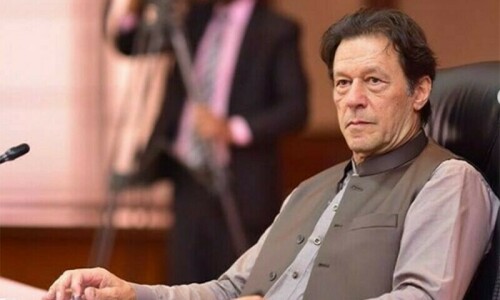ISLAMABAD: The Islamabad High Court on Monday sought the appointment record of the judge conducting the trial of former prime minister Imran Khan under the Official Secrets Act.
A two-judge bench comprising Justice Miangul Hassan Aurangzeb and Justice Saman Rafat Imtiaz issued the directives while hearing Mr Khan’s intra-court appeal (ICA) against the IHC’s decision to dismiss his plea for an open trial in the cipher case.
The bench also ordered IHC registrar Tahir Sabir to present the letter written by Judge Abual Hasnat Zulqarnain to the IHC administration for permission to conduct the ex-PM’s trial in jail.
During the hearing, Mr Khan’s counsel, Salman Akram Raja, claimed that the judge “virtually conducted the in-camera trial in the jail”.
Qureshi claims immunity, moves apex court for bail
Justice Aurangzeb reminded the counsel of Attorney General Mansoor Uman Awan’s assertion that the judge took the decision due to threats to Mr Khan’s life.
The court will not examine the nature of threats referred to by security agencies, but relevant provisions of the law for the appointment of Judge Zulqarnain and the decision to conduct the trial in jail.
Mr Khan’s counsel argued that security concerns should be based on material available on record.
Attorney General Awan said the government’s decision to conduct a jail trial was “an administration action” that could be challenged but not be assailed under the Law Reforms Ordinance.
The court was, however, of the view that the administrative order could come under judicial scrutiny.
When the bench asked what caused the judge to go for a jail trial, the attorney general replied that “the presiding judge has taken note of the security threat”.
Advocate Raja argued that the trial court judge’s conduct disentitled him to proceed in the cipher case. “The manner of deciding to conduct the jail trial was erroneous.”
According to him, the request to declare the jail premises a court has to be routed through the chief commissioner concerned.
Justice Aurangzeb remarked that such issues emerged since special courts are not in the administrative control of the high court.
“All these miseries will end if these courts are brought under the high court’s administration.”
Continuing with his arguments, Advocate Raja said the federal cabinet approved the jail trial on Nov 15 and applied it with retrospective effect. “[The] cabinet cannot give approval retrospectively. It could have granted consent but with prospective effect.”
He also objected to the appointment of Judge Zulqarnain as special court judge.
“The competent authority for appointing the judge is the federal government,” Justice Aurangzeb observed.
However, Mr Raja argued that the judge’s appointment required consultation with the chief justice.
He requested the court to declare the trial court proceedings illegal and also sought an order for an open court trial.
Advocate Raja requested the court to set aside the trial court proceeding as, in addition to these anomalies, the charge was also “not framed properly”, and that too in an offence carrying the death penalty.
Moreover, the cipher — key evidence in the case — and other documents were not shared with the defence counsel, he added.
The bench adjourned further hearing till Tuesday (today).
Qureshi moves SC
In a related development, PTI Vice Chairman Shah Mehmood Qureshi filed a petition in the Supreme Court against the dismissal of his bail plea in the cipher case by the IHC.
He contended that the judge “did not properly consider facts” while examining the plea.
According to Mr Qureshi, he was not nominated in the FIR and could not be booked due to immunity under Article 248 as he was the foreign minister when the alleged illegal action occurred.
In his judgement, IHC Chief Justice Aamer Farooq had said the jail trial meant in-camera proceedings, and not an open trial.
Published in Dawn, November 21st, 2023















































Dear visitor, the comments section is undergoing an overhaul and will return soon.